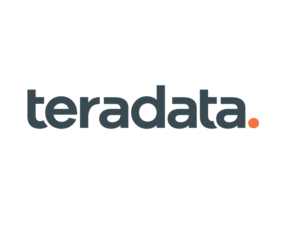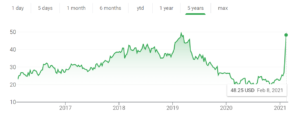
Teradata Rides Cloud Wave to Two-Year High

Teradata’s market capitalization has grown about $2 billion during the past two trading sessions and is trading near a two-year high thanks to better-than-expected financial results announced Thursday afternoon. The San Diego analytics software company attributed its strong earnings to strong adoption of its software in the cloud.
During the fourth quarter of fiscal year 2020 ended December 31, Teradata’s total revenue was actually down, from $494 million a year ago to $491 million in the quarter that just ended. For the year, the company reported a 3% drop in total revenue, from $1.89 billion to $1.84 billion.
But it was the type of revenue that drew investors’ attention. In the fourth quarter, its annual recurring revenue (ARR) grew by 11%, from $1.43 billion to $1.59 billion, compared to the fourth quarter of 2019 (9% at constant currency).
What’s more, the public cloud component of that spending amounted to $106 million, which was a 165% increase from the same quarter a year ago (159% at constant currency). These figures show that Teradata’s cloud and subscription business grew at a surprisingly fast pace.
“Our Cloud-First focus has been recognized by our customers and the marketplace,” Teradata President and CEO Steve McMillan stated in a press release. “Our cloud momentum has contributed to another strong quarter of performance, as we exceeded quarterly expectations for recurring revenue, profitability, and free cash flow.”
Teradata has been under pressure to transition its data warehousing and analytics software business from an on-premise, perpetual-license model to a cloud-first, subscription model. The company has adapted its Vantage platform to run on all three major public clouds, giving it cloud-based options to compete against AWS Redshift, Microsoft Azure Synapse, and Google Cloud Big Query, as well as Snowflake, which is arguably its biggest competitor.
In a recent interview with Datanami, McMillan predicted that the company would be turning heads and changing perceptions.
“Teradata has done a really good job of hiding how good we are in the cloud,” McMillan said. “We have had a good cloud product. It’s getting better all the time.”
McMillan pointed to several moves that Teradata made in 2020 that helped to solidify its cloud business, including going native on Google Cloud and enabling its data warehouse to run on object stores, as opposed to requiring that data is stored its own proprietary database. Shifting to consumption-based pricing (“You only pay for what you’re using”) and paring back its services firm, also helped, he added.
“We set out some really good foundations in the cloud, and I think a lot of folks just don’t know about it,” McMillan said. “I think what we have to do is really work out how to get that message and perspective out there that we have a fantastic technology.”
McMillan joined Teradata as the CEO and president last June. His predecessor in the CEO’s chair, Oliver Ratzesberger, lasted less than a year and left the company in December 2019 as the company struggled to gain traction as the market for data analytics software shifted rapidly to the cloud. Vic Lund, who preceded Ratzesberger as CEO, took the position.
While the cloud clearly will be a key to longevity for McMillan, it doesn’t mean that the company is making a complete break from its history (although clearly the days of running data warehouses on expensive, proprietary hardware is over).
McMillan maintains that Teradata’s 40 years of experience in building data warehouses and analytics systems gives it a key competitive advantage that can’t be easily replicated, particularly in areas like work management and data governance, as well as connecting analytics to business outcomes.
“Our history, the knowledge that we’ve got in terms of helping some of the world’s largest telecos re-imagine how to use data based on their subscribers and devices and their 5G network and orchestrate that data across all of their supply chain and value chain and deliver that as set of results–taking those kinds of experiences and delivering them on a day-to-day basis, and working with the partners and large system integrators to do that–is a real differentiator,” McMillan said.
Wall Street rewarded Teradata (NYSE: TDC) as soon as its results were announced Thursday afternoon. The company’s stock rose from about $27 per share at the Thursday closing to $37 per share at the Friday closing. It rose again today and reached a 23-month high of $49.05 before closing at around $48.
Related Items:
He Couldn’t Beat Teradata. Now He’s Its CEO
Cloud Is the New Center of Gravity for Data Warehousing




























